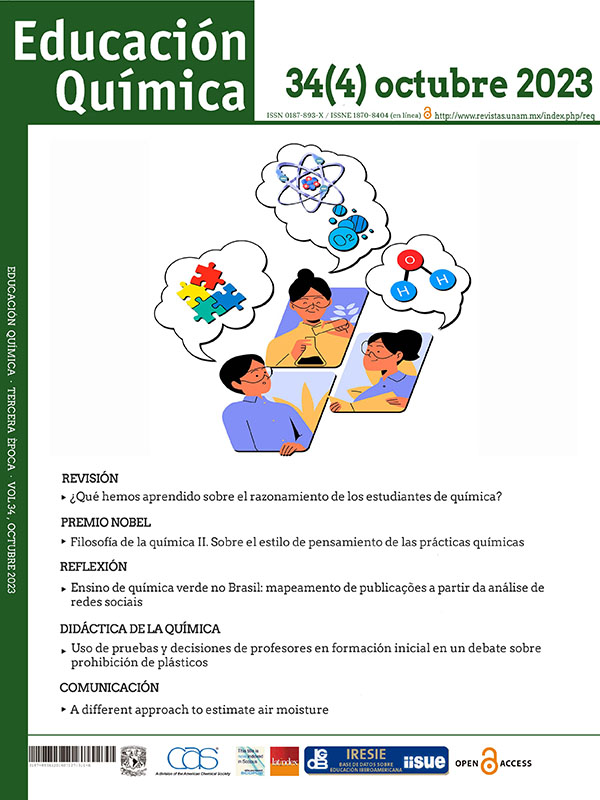Dificultades en el razonamiento causal y en los conceptos utilizados para explicar el efecto Mpemba
Contenido principal del artículo
Resumen
Este estudio describe el análisis de las explicaciones de estudiantes de un programa de formación docente sobre el efecto Mpemba. La experiencia se presentó en tres momentos (antes, durante y después), con la participación de 37 estudiantes de 8º semestre de la Licenciatura en Ciencias Naturales de una universidad colombiana. Se observó que los estudiantes responden al por qué y no al cómo ocurre el fenómeno y asocian sus contestaciones a flujo de calor, cinética molecular y cambio de estado del material. Lo anterior, evidencia la necesidad de practicar de razonamiento sobre mecanismos causales en química, aspecto que puede contribuir a que los estudiantes comprendan las interacciones moleculares.
Detalles del artículo
Citas en Dimensions Service
Citas
Clement, C. A., and Yanowitz, K.L. (2003). Using an analogy to model causal mechanisms in a complex text. Instructional Science, 31(3), 195-225.
Craver, Carl F. (2001). Role Functions, Mechanisms, and Hierarchy. Philosophy of Science, 68(1):53–74.
Craver, C. and Tabery, J. (2017): “Mechanisms in Science”, en The Stanford Encyclopedia of Philosophy, E. N. Zalta, ed., https://plato.stanford.edu/archives/spr2017/entries/science-mechanisms/
Creswell, J.W. (2013). Steps in conducting a Scholarly Mixed Methods Study: What I Am Looking for Core Characteristics: Do You Have a Quantitative Database? (Closed‐ Ended). University of Nebraska – Lincoln, 54.
Glennan, S. (2005). Modeling Mechanisms. Studies in History and Philosophy of Science, Part C: Studies in History and Philosophy of Biological and Biomedical Sciences, 36(2):443–64.
Greene, D., O’Callaghan, D. and Cunningham, P. (2014). How Many Topics? Stability Analysis for Topic Models. Pp. 498–513 in Lecture Notes in Computer Science (including subseries Lecture Notes in Artificial Intelligence and Lecture Notes in Bioinformatics). Vol. 8724 LNAI.
Grotzer, T. A. 2003. Learning to understand the forms of causality implicit in scientific explanations. Studies in Science Education, 39,1–74.
Huang, Y., Zhang, X., Ma, Z., Zhou, Y., Zheng, W., Zhou, J., and Sun, C.Q. (2015). Hydrogen-Bond Relaxation Dynamics: Resolving Mysteries of Water Ice. Coordination Chemistry Reviews 285, 109–65.
Illari, P. M. (2011). Mechanistic evidence: disambiguating the Russo–Williamson thesis. International Studies in the Philosophy of Science 25(2), 139-157.DOI: 10.1080/02698595.2011.574856
Jeng, M. (2006). The Mpemba Effect: When Can Hot Water Freeze Faster than Cold? American Journal of Physics 74(6):514–22
Koslowski, B. (1997). Theory and Evidence: The Development of Scientific Reasoning. Cambridge, MA: MIT Press.
Machamer, P., Darden, L., and Craver, C. F. (2000). Thinking about mechanisms. Philosophy of science 67(1), 1-25.https://www.jstor.org/stable/188611
Metz, K. E. (1991). Development of explanation: Incremental and fundamental change in children’s physics knowledge. Journal of Research in Science Teaching, 28(9), 785 – 797.
Miles, M.B., Huberman, A.M. and Saldaña, J. (2014). Qualitative Data Analysis: A Methods Sourcebook (3rd Ed.). Thousand Oaks, CA: Sage Publications.
Moreira, P., Marzabal, A. and Talanquer, V. (2019). Using a Mechanistic Framework to Characterise Chemistry Students’ Reasoning in Written Explanations. Chemistry Education Research and Practice 20(1):120–31
Russ, R.S., Scherr, R.E., Hammer, D. and Mikeska. J. (2008). Recognizing Mechanistic Reasoning in Student Scientific Inquiry: A Framework for Discourse Analysis Developed from Philosophy of Science. Science Education 92(3):499–525.
Schauble, L. (1996). The Development of Scientific Reasoning in Knowledge-Rich Contexts. Developmental Psychology 32(1):102–19.
Solbes, J. and Tarín, F. (2008). Generalizando el concepto de energía y su conservación. Didáctica de las ciencias experimentales y sociales, 22: 155-180 https://ojs.uv.es/index.php/dces/article/view/2415
Talanquer V., (2018), Exploring mechanistic reasoning in chemistry, in Yeo J., Teo T. W. and Tang K. S. (ed.), Science Education Research and Practice in Asia-Pacific and Beyond, Singapore: Springer 39–52
Tao, Y., Zou, W., Jia, J., Li, W. and Cremer, D. (2017). Different Ways of Hydrogen Bonding in Water - Why Does Warm Water Freeze Faster than Cold Water? Journal of Chemical Theory and Computation 13(1):55–76.
Torres, N.Y., Corrêa, T.H.B., and Solbes, J. (2022). Relaciones causales explicativas en la educacion científica y su contribución al pensamiento crítico. Investigações Em Ensino De Ciências, 27(3), 239–253. https://doi.org/10.22600/1518-8795.ienci2022v27n3p239
Tyrovolas, I. J. 2017. Explanation for the Mpemba Effect. Journal of Modern Physics 08(12):2013–20.
Zhang, X., Huang, Y., Ma, Z., Zhou, Y., Zhou, J., Zheng, W., Jiang, Q. and Sun, C.Q. (2014). Hydrogen-Bond Memory and Water-Skin Supersolidity Resolving the Mpemba Paradox. Physical Chemistry Chemical Physics 16(42):22995–2.

Educación Química por Universidad Nacional Autónoma de México se distribuye bajo una Licencia Creative Commons Atribución-NoComercial-SinDerivar 4.0 Internacional.
Basada en una obra en http://www.revistas.unam.mx/index.php/req.




